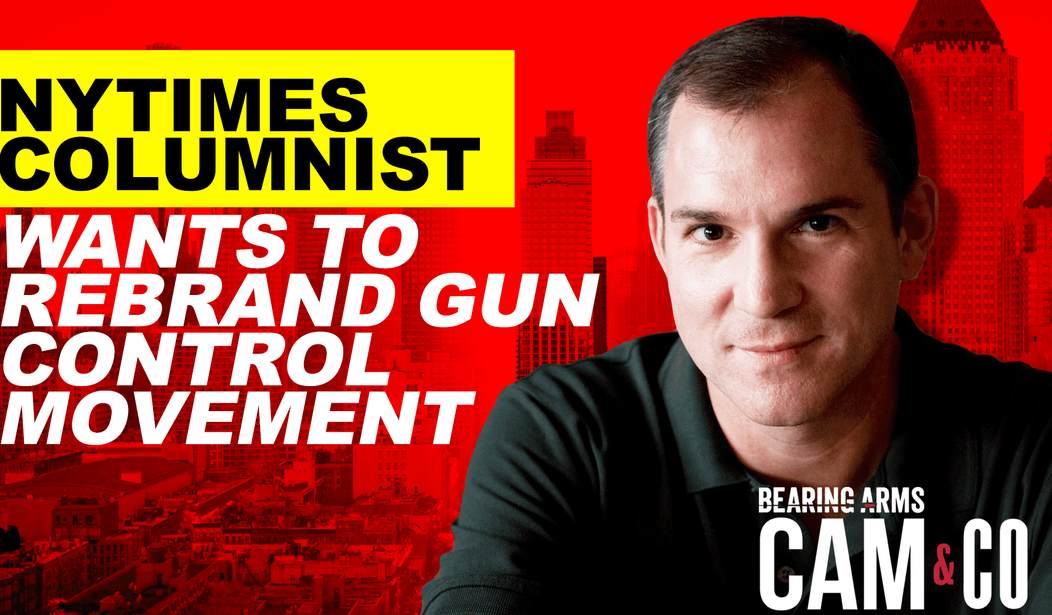To be fair, Frank Bruni of the New York Times is far from the first gun control advocate to suggest dropping the phrase “gun control” from the vocabulary of anti-gun activists. His argument, however, is one of the most blatant endorsements of disinformation that I’ve seen from anyone calling themselves a journalist.
In his latest column for the Times, Bruni comes right out and admits that he wants to encourage other journalists to stop using the phrase “gun control” and replace it with “gun safety” because the former phrase isn’t helpful to the gun control cause.
There’s an argument for “gun control,” absolutely. It’s accurate: The legislation in question entails more government control over who can purchase guns and when and how. “Gun control” is probably the most instantly and widely recognized shorthand for the debate over such laws, and journalism depends on verbal economy, my own columns notwithstanding.
But it’s off key. It’s unhelpful. And it’s an example of the loaded language that often shapes our discourse on important matters.
Is vocabulary destiny? It certainly plays its part. I don’t think “gun control” is the main thing standing in the way of additional measures to protect Americans from gun violence and to diminish the number and near-instant availability of guns in a country crazily saturated with them. But how we write and talk about this issue is inevitably consequential.
How we write and talk about any issue that engenders passionate disagreement is.
So Bruni admits that “gun control” is an accurate description of what groups like Brady, Everytown for Gun Safety, and Giffords really want. It’s just that, in this case, being accurate hurts the cause, so it’s better to rebrand the movement and stop using the offending (and accurate) phrase.
About two decades ago, the advocacy group Handgun Control Inc., which had begun in the 1970s as the National Council to Control Handguns, formally changed its name to the Brady Campaign to Prevent Gun Violence. It’s now just Brady. (Brady refers to Jim Brady, who was shot during an assassination attempt against President Ronald Reagan, and Brady’s wife, Sarah.)
And that was part of a march toward “safety.”
“If you’re a person who doesn’t want to see our gun laws change, it makes sense that you would evoke the rhetoric of ‘gun control,’ especially in a place like America, where individual freedom is so celebrated,” said Jonathon Schuldt, an associate professor at Cornell University whose expertise includes the role of language in opinion making. “It’s much harder to justify being against ‘safety’ than it is to justify being against ‘control.’”
The problem for Bruni and other gun control activists is that their definition of gun safety is “don’t own a gun,” and it really doesn’t matter what you call it as long as the intent is the same. The mission of Handgun Control, Inc. was the same as the mission of the Brady Campaign to Prevent Gun Violence, which is also the same mission of Everytown for Gun Safety: to put new laws on the books criminalizing the right to keep and bear arms, thereby reducing the number of legal gun owners and (eventually) the number of guns available for criminals.
Even Bruni reluctantly acknowledges the problem in his concluding paragraphs.
I’ve inadvertently used “gun control” in several columns over the past two years. In my weekly newsletter several days ago, I wrote “more stringent firearm restrictions” in its stead. I was steering clear of “gun control” only to land in another ditch by the side of the road.
Stringent? Restrictions?Unduly negative, especially for an opinion columnist with more license to use the language of his choice.
There’s no really good way to put a positive spin on trying to curtail the constitutionally-protected rights of American citizens. You can justify it by claiming your proposals are “common sense,” you can claim it’s “for the children,” and you can steadfastly refuse to call your gun control agenda what it is and hide behind phrases like “gun violence prevention,” but none of that changes what these proposals would actually do or who they’re aimed at.
Frank Bruni is a gun control advocate, and the movement he supports is the gun control movement. He can try to remove that phrase from his vocabulary, but all he’s really doing is lying to his readers instead of leveling with them. It’s probably too much to ask that the media be honest about their agenda, but it’s also telling that Bruni and other anti-gun activists feel that they have to lie and manipulate language in order to increase support for the infringements they want to put in place.









Join the conversation as a VIP Member